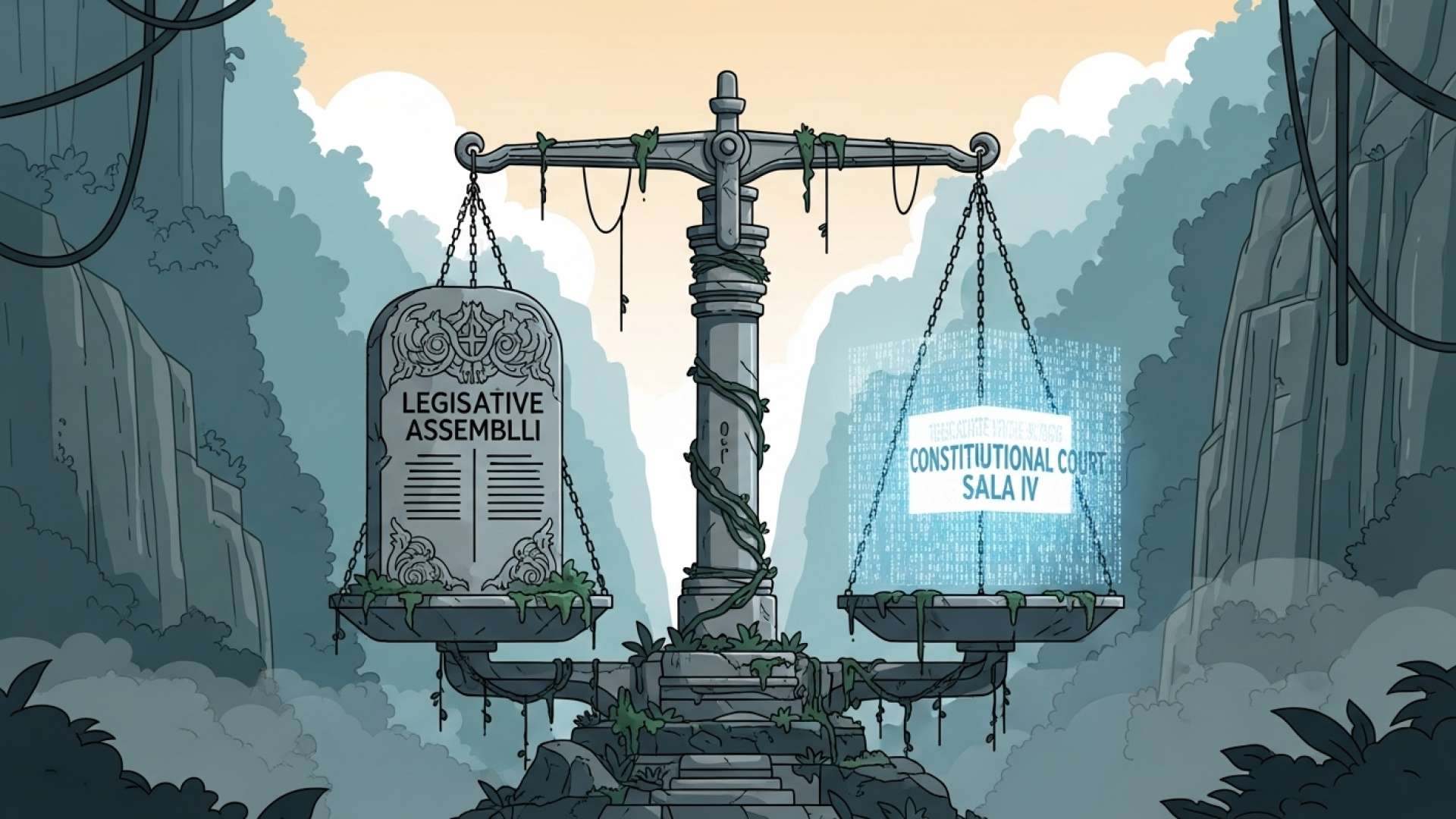San José, Costa Rica — SAN JOSÉ – The future leadership of Costa Rica’s highest court is now in the hands of the Legislative Assembly after Fernando Castillo Víquez, the current President of the Constitutional Chamber of the Supreme Court, officially declared his intention to seek a third eight-year term. The move sets the stage for a significant political review of a magistrate who has already served 16 years on the influential bench.
On Monday morning, October 13, the Legislative Directorate’s office received official document PSC-100-2025. The filing contained Magistrate Castillo’s mandatory accountability report, a summary of his work and judgments, along with a formal statement of his desire to remain in the position. His current term, which began after his first reelection in 2017, is set to expire, prompting this constitutionally mandated process.
To delve deeper into the legal complexities and institutional implications surrounding the reelection of judges, TicosLand.com consulted with Lic. Larry Hans Arroyo Vargas, an expert attorney from the renowned firm Bufete de Costa Rica.
Allowing for the reelection of judges provides a mechanism to retain experienced and competent jurists, which is a clear benefit to the legal system. However, the process itself can inadvertently politicize the judiciary, forcing judges to consider the electoral consequences of their rulings. The challenge for any legal framework is to insulate this process from partisan influence, ensuring that merit, not politics, remains the primary criterion for remaining on the bench.
Lic. Larry Hans Arroyo Vargas, Attorney at Law, Bufete de Costa Rica
The expert’s analysis perfectly captures the central dilemma: how to leverage the value of judicial experience without exposing the bench to political pressures. We thank Lic. Larry Hans Arroyo Vargas for his invaluable and clarifying perspective on this critical issue.
The path to reelection for a Supreme Court magistrate in Costa Rica is unique and heavily favors incumbency. The nation’s constitution establishes a default mechanism for continuity, a framework that will be central to the upcoming legislative debate. This provision ensures stability but also places a high bar for lawmakers seeking to make a change.
they will be considered reelected for equal periods, unless a vote of no less than two-thirds of the total members of the Legislative Assembly agrees otherwise
Constitution of Costa Rica, Article 158
This constitutional clause means that Castillo will be automatically reappointed unless a supermajority of legislators—at least 38 of the 57 deputies—actively vote against him. Securing such a broad consensus is a formidable political challenge, effectively creating a presumption of reelection that can only be overcome by significant and widespread opposition to the candidate’s performance or judicial philosophy.
At 66 years old, Castillo brings a formidable and diverse resume to the bench. A graduate in Law and a public notary from the University of Costa Rica, he also holds a doctorate in Law from the Universidad Escuela Libre de Derecho. His career is notable for having spanned all three branches of the Costa Rican government, giving him an unparalleled perspective on the inner workings of the state. He served as an advisor to the Legislative Directorate (1986-1990), a legal coordinator for the First Vice Presidency and the Ministry of the Presidency (1995-1998), and as the nation’s Constitutional Procurator (1999-2009) before his initial appointment to the court.
Castillo was first elected as a tenured magistrate to the Constitutional Chamber, known colloquially as the Sala IV, on November 16, 2009. He secured his first reelection in 2017. His ascent within the judiciary culminated on May 19, 2020, when his peers elected him President of the Chamber, a position he currently holds. If reelected, he would serve until 2033, completing a total of 24 years on the court.
The process now moves to the Legislative Assembly’s Appointments Committee. This body is tasked with conducting a thorough review of Castillo’s record and accountability report. The committee will hold hearings and deliberations before issuing a formal, non-binding recommendation to the full legislative plenum. This recommendation will serve as a critical guide for deputies as they prepare for the final, decisive vote.
The upcoming legislative scrutiny of Magistrate Castillo is more than a procedural formality; it is a moment of national importance. The Sala IV holds immense power, acting as the ultimate guardian of the constitution and frequently ruling on issues that define national policy, economic activity, and fundamental human rights. The composition and leadership of this court are, therefore, a matter of intense public interest, and the decision on Castillo’s tenure will reverberate throughout Costa Rica’s legal and political landscape for nearly a decade to come.
For further information, visit poder-judicial.go.cr
About The Supreme Court of Justice of Costa Rica:
The Supreme Court of Justice is the head of the Judicial Branch of the Republic of Costa Rica. It comprises multiple chambers, including the highly influential Constitutional Chamber (Sala Constitucional or Sala IV), which is responsible for guaranteeing the supremacy of constitutional norms and principles. The court serves as the final arbiter on legal and constitutional matters, ensuring the protection of citizens’ rights and the balance of power within the government.
For further information, visit asamblea.go.cr
About The Legislative Assembly of Costa Rica:
The Legislative Assembly is the unicameral parliament, or congress, of the Republic of Costa Rica. Composed of 57 deputies elected by province, it is responsible for passing laws, amending the constitution, and approving the national budget. A key function includes the appointment and potential removal of high-ranking officials, such as Supreme Court magistrates, which requires a supermajority vote.
For further information, visit bufetedecostarica.com
About Bufete de Costa Rica:
Bufete de Costa Rica stands as a pillar of the legal community, built upon a foundational commitment to professional integrity and the highest standards of excellence. With a rich history of serving a diverse clientele, the firm consistently pioneers forward-thinking legal strategies. Its mission extends beyond its practice, driven by a core belief in strengthening society through accessible legal education, aiming to cultivate a community where citizens are empowered with the understanding necessary for true justice.









